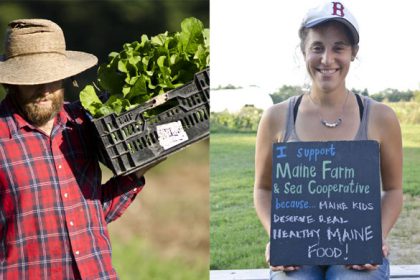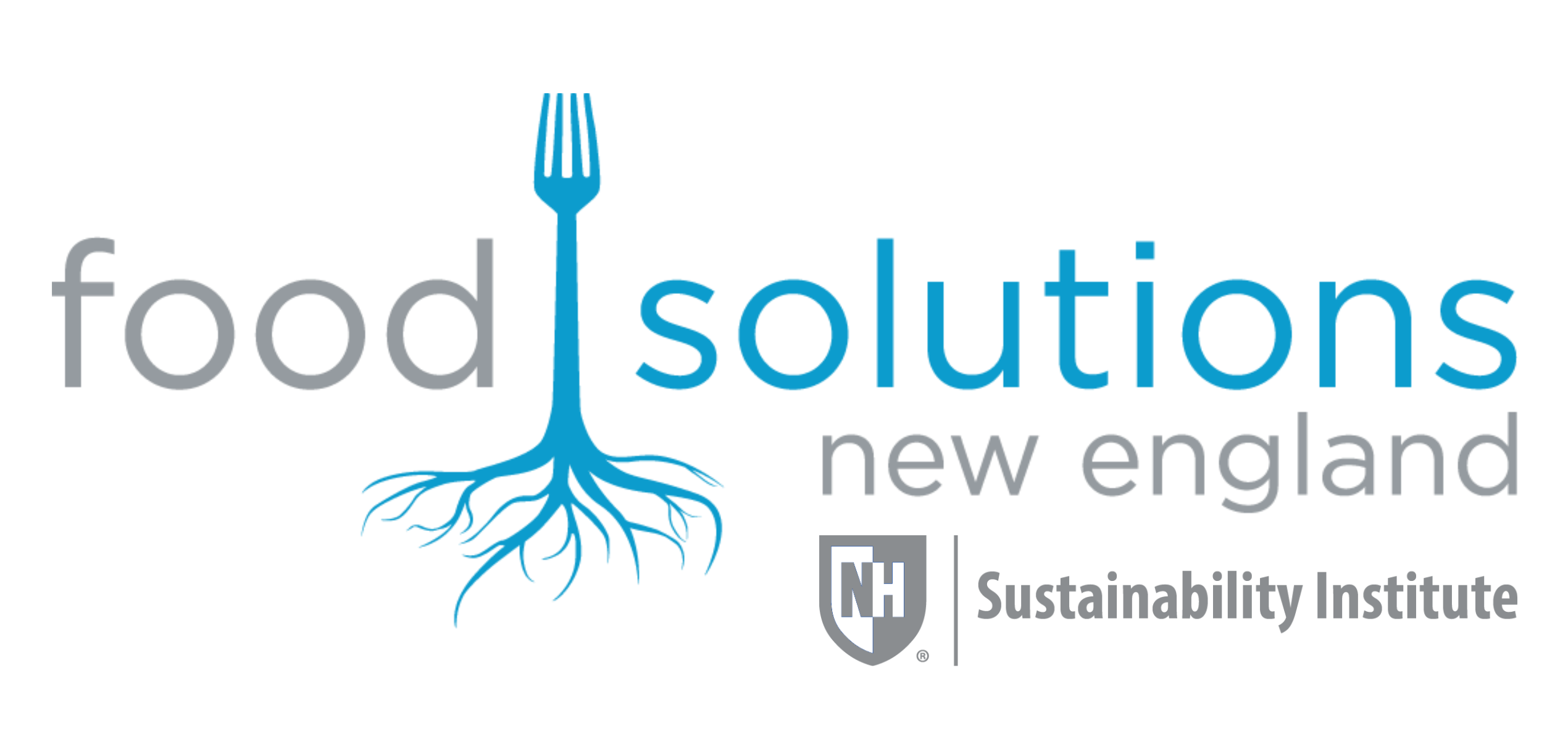
For the past 10 years, University of Maine students have been fed by a giant corporate food distributor. If Maine Farm & Sea Cooperative wins the next contract, they’ll send millions of dollars to local farmers and fishermen instead.
 Imagine university students across the state of Maine sitting down to eat local vegetables harvested two days ago at Jordan’s Farm; and fish caught by local fishermen at Port Clyde Fresh Catch. Imagine that they were delivered by truck from Crown O’Maine Organic Cooperative and prepared by local people. Now imagine that all of these people are owners of this food system, sharing in the governance and profits as a cooperative. This vision is why we created Maine Farm & Sea Cooperative—a local food procurement and food service management company that is owned by producers, workers, and Maine residents.
Imagine university students across the state of Maine sitting down to eat local vegetables harvested two days ago at Jordan’s Farm; and fish caught by local fishermen at Port Clyde Fresh Catch. Imagine that they were delivered by truck from Crown O’Maine Organic Cooperative and prepared by local people. Now imagine that all of these people are owners of this food system, sharing in the governance and profits as a cooperative. This vision is why we created Maine Farm & Sea Cooperative—a local food procurement and food service management company that is owned by producers, workers, and Maine residents.
For the past 10 years, Aramark, a global food service management company based in Philadelphia, has controlled the University of Maine’s contract to provide food service management at six campuses—from Fort Kent on the Canadian border, down to the University of Southern Maine in Portland and Gorham. Critics have complained that companies like this purchase little local food and pay low wages, and that such contracts funnel millions of dollars out of local economies to headquarters elsewhere. But next year, Aramark’s contract with the university expires, opening up a market of 10,000 students. In August the university issued a request for proposals from food service management companies to bid on this contract, which is estimated to generate $12.5 million in annual revenue. With this request, the institution committed to purchasing 20 percent local food by 2020, noting the positive impact it would have on the local economy.
This month, we at Maine Farm & Sea Cooperative submitted a bid for this contract, going up against Sodexo, a multinational corporation based in France, and Aramark. (Together, Sodexo, Aramark and a third company, Compass Group, control 90 percent of the U.S. institutional food market.) In the next two months, university officials will decide who’s going to be feeding their students, and what kind of economy they want to support.
What sets us apart from the other contenders? We are a Maine-owned cooperative that wants to use the purchasing power of our public university to benefit our communities, environment, and economy. We propose to meet the university’s goal of 20 percent local food in the first year of operations, and to increase it 2 percent for each year after that. And we’d work in partnership with Maine producers to develop the supply and infrastructure needed to supply our institutions. We also propose to hire existing Aramark workers, give them a raise and increased benefits, and provide them the opportunity to become owners of the cooperative, sharing in its profits. We will look to reduce our ecological footprint by composting, supporting student greenhouses and campus farms, offering bike delivery and catering, and reducing food waste.
“If we can all do this together then it is one other way for farmers to help define what makes sense for them to get their product from farm to table and really participate in the profits,” said Penny Jordan, a 5th-generation farmer at Jordan’s Farm in Cape Elizabeth, a suburb of Portland. Penny and other farmers face many obstacles in selling their food to institutions, since corporate distributors and institutional buyers tend to set inflexible standards that don’t work for smaller farms, and pay low prices to local producers.
Fortunately, more institutions are looking at ways in they can support local producers and cooperatives, using their purchasing power to build local economies.
The multipliers
Ron Adams, the food service director of Portland Public Schools, leveraged support from a food council connected with the city government to increase his school district’s purchasing to 35 percent and develop a central kitchen to process local foods. In the early ‘90s Adams started providing food to young children at summer feeding programs and after-school sites. He then expanded his work, going on to provide food for grades K-12 at four local school districts. Through his work he has become a highly respected pioneer in the movement to get farm food into school cafeterias. Earlier this year, after retiring from Portland Schools, Ron turned his energy into co-founding Maine Farm & Sea Cooperative.
Also on the board are Marada and Leah Cook, sisters and worker-owners of Crown O’Maine Cooperative, a business their father started in 1996 to allow more of his fellow Northern Maine potato farmers to access markets in the southern part of the state and beyond. Marada is intimately aware of the challenges faced by farmers, from planting to marketing, and believes that the new co-op could “provide farmers and fishermen with consistent demand for their products at predictable and fair prices, enhancing Maine’s rural economies and creating jobs.”
“Maine Farm & Sea Cooperative is uniquely positioned, given its local roots, reputation, and contacts within the local communities, to deliver the greatest impact to the State of any of the Contract bidders,” says John Entwistle, the board treasurer and former Center Director for the Small Business Development Center at the University of Southern Maine. Our model will increase the economic impact of the University by reinvesting profits back into the Maine economy and communities: We’ll employ local people in all roles and subcontract with local companies. The combined multiplier effect, should we get the contract, would amount to almost $12 million, from local food purchases, employment, and service income.
Our work is inspired by movements: the strong local food movement in Maine; and the movement to harness anchor institutions to invest in local cooperative development. In Cleveland, the Evergreen Cooperatives have worked with Case Western University and the Cleveland Hospital to develop a commercial laundromat, solar-power company, and large-scale greenhouse. In Springfield, Massachusetts, the Wellspring Cooperatives created a greenhouse and upholstery business to meet the needs of local institutions. In Maine, Real Food Challenge, a student group that brings sustainable, local food to schools, organized with local and regional groups to form the Maine Food for UMaine System Campaign. It was instrumental in convincing the UMaine System to commit to 20 percent local by 2020. In addition to the University of Maine system, we are pursuing contracts with schools, hospitals, corporations, and other institutions that want to buy local. Over the next few months we will continue to grow our operation as we sign up new community- and producer-owners, secure investments and financing, and build public pressure on the University of Maine.
At this time next year, we want to be sitting down in the dining hall at a University of Maine System campus with our fellow cooperative owners, enjoying a delicious dinner of roasted Port Clyde Fresh Catch’s pollock over Jordan’s Farm butternut squash, with a side salad of fresh greens grown in the student-run greenhouse.
Learn more at www.mainefarmandsea.coop
This article was originally published by YES! Magazine as part of New Economy Week, in a collaboration with the New Economy Coalition that brings you the ideas and people helping build an inclusive economy—in their own words.
Jonah Fertig is a co-founder of Maine Farm & Sea Cooperative, a Cooperative Development Specialist with the Cooperative Development Institute, and co-founder of Local Sprouts Cooperative, a worker-owned cafe and catering business in Portland, Maine. He also co-founded the Machigonne Community Land Trust in Portland, the Portland Urban Agriculture Sub-Committee that is part of the Mayor’s Initiative for a Healthy and Sustainable Food System, Cooperative Fermentation, and more. He lives on a farm in Durham, Maine with his partner and two kids.
This is Jonah’s third blog post in a series on cooperatives in Maine.




